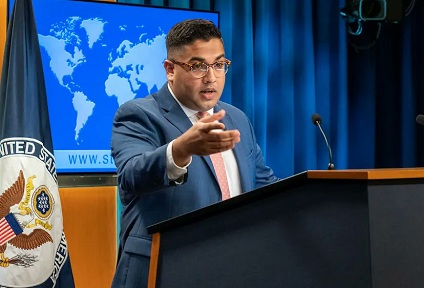US State Department spokesman Vedant Patel claimed on Wednesday that his country remained deeply concerned about the draft law on “foreign agents”, which was approved in the first reading by the Georgian parliament, sparking protests in the capital city of Tbilisi.
We will continue to urge and reiterate with the Georgian government our dire concern at this legislation.
Patel warned that if passed, the bill could “stigmatise civil society organisations working to improve the lives of Georgian citizens and media organisations operating within Georgia to provide information to Georgian citizens.”
“We think that civil society, journalism, media organisations are cornerstones to any democratic society, and we urge the Georgian government to heed warnings that this bill is not in line with the European Union’s norms and values.”
Georgia voted in favour of advancing a bill on “foreign agents” on Wednesday, but critics argued it would undermine the country’s democracy. The EU called the approval “very concerning development”, claiming that final passage of the bill would have a negative impact on Georgia’s EU accession process.
Georgian Prime Minister Irakli Kobakhidze stated that parliamentary discussions “confirmed” that “opponents of the bill have no argument against it”, according to Georgian media. He added that the bill “serves the nation’s European integration objective.”
The bill requires organisations, including media outlets, that receive over 20% of their funding from abroad to register as agents of foreign influence. Such organisations will be obliged to publish annual financial reports.
Similar legislation in US and EU
The United States has a similar law introduced in 1938 entitled the Foreign Agents Registration Act (FARA). It requires certain agents of foreign principals who engage in political or other activities specified in the act to disclose publicly their relationship with the foreign principal on a time-to-time basis. Such organisations must also report their activities, revenues and expenditures supporting such activities, according the US Department of Justice.
Disclosure of the required information facilitated the assessment by the government and the American people of such entities’ activities in terms of their function as foreign agents, the government explained. The FARA Unit of the Counterintelligence and Export Control Section (CES) in the National Security Division (NSD) is responsible for administering and enforcing FARA.
Since 2016, looking at foreign interference in the broader context of so-called “hybrid threats”, the EU has also passed a number of legislative acts in policy areas, such as “energy security, safeguarding of critical infrastructure, data protection, screening of foreign investment and transparency of political funding.”
In June 2020, the European Parliament decided to step up the campaign against foreign interference by setting up a special committee tasked with analysing a wide range of forms of foreign interference in the democratic institutions and processes of the EU and its member states. In March 2022, the European Parliament formally adopted the committee’s report on “foreign interference in all democratic processes in the European Union“, according to EU Reporter.
At its core, the report details elements of the EU’s future strategy against foreign interference. In fact, there have already been European Parliament initiatives aimed at strengthening restrictions on EU-funded non-governmental organisations (NGOs).
In 2017, a draft report on budgetary control of EU funding for NGOs included a requirement to restrict EU funding to those NGOs that “argue by means of verifiable facts” that their objectives are not “contrary to the fundamental values of the European Union, democracy, human rights and/or strategic commercial and security-policy objectives of the European Union institutions.”
